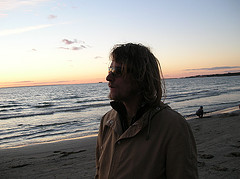[caveat lector: these are first impressions based on deeply incomplete information--hopefully, in that respect, unlike some other things I write.]
 "Just turn it off," Aadam says in English with an exagerrated Estonian accent. On the way from the airport, I had remarked at the large number of ads for political parties. There are elections coming up, he concedes, but he doesn't know when and doesn't really care. Politicians do whatever they want. Igasugused intriigid, all kinds of intrigues and scandals are in the papers, with politicians going back and forth between parties. So Aadam doesn't care; in any case, he's tuned out the political background noise, and says he doesn't notice the ads anymore.
"Just turn it off," Aadam says in English with an exagerrated Estonian accent. On the way from the airport, I had remarked at the large number of ads for political parties. There are elections coming up, he concedes, but he doesn't know when and doesn't really care. Politicians do whatever they want. Igasugused intriigid, all kinds of intrigues and scandals are in the papers, with politicians going back and forth between parties. So Aadam doesn't care; in any case, he's tuned out the political background noise, and says he doesn't notice the ads anymore.
But it also seems that there's very little in the way of activism. Though the vast majority of the population is against the war, for example, but the government--like many others in Europe--has been enthusiastically on side. The stand (and other kowtowing) is generally understood to be for the principle purpose of securing the good graces of the Americans, which is overwhelmingly seen as favourable any graces of the Russians. Indeed, the foreign policy focus of the first decade-and-some after independence was gaining NATO and EU membership, primarily to stave off another Russian invasion, or incursion.
There are a few subversive filmmaker types and a well-known anarchist lead singer of a folk-punk band who wrote a book on the history of anarchism, but very little organizing. According to Aadam (who is a distant relative of mine) young people are simply laisad, lazy. (All of this was said with a half-joking, cynical tone, in casual conversation.)
The main exceptions to the rule of no grassroots movements seems to be rohalised, greens, and the pensioners. I actually don't know anything about the pensioners, except that they protest at the Parliament building on occasion, live on very small cheques from the government, and are a key constituency to appeal to if you're a politician.
Rohelised
The "green" movement here differs markedly from the North American or even Western European version in that it seems to stem--almost universally--from a pre-existing socio-cultural dependence on the land, rather than from a combination of economic, aesthetic and moral considerations. In other words, I don't think it's so much of a political choice to think ecologically as it is a prerequisite of understanding one's own identity.
 Estonian green philosophy differs ontologically in a key respect as well. There's much less emphasis on keeping anything pristine (which ends up being a key rhetorical if not through-and-through political point in N. America), because people have been living here for thousands of years, and have had a huge impact on the landscape. It's just that that impact has been a dialogue (punctuated, no doubt, by shouting matches) with the regional ecology, rather than a one sided exploitation of it. While there's some talk of preservation, it mostly seems to be a matter of amplifying practices that have developed over millenia (though they may have been sidetracked by Soviet über-industrialism and hyper-exploitation of the landscape in the last half-century).
Estonian green philosophy differs ontologically in a key respect as well. There's much less emphasis on keeping anything pristine (which ends up being a key rhetorical if not through-and-through political point in N. America), because people have been living here for thousands of years, and have had a huge impact on the landscape. It's just that that impact has been a dialogue (punctuated, no doubt, by shouting matches) with the regional ecology, rather than a one sided exploitation of it. While there's some talk of preservation, it mostly seems to be a matter of amplifying practices that have developed over millenia (though they may have been sidetracked by Soviet über-industrialism and hyper-exploitation of the landscape in the last half-century).
It's still very much an indigenous culture; ecology is present in many of the key metaphors that make up written and spoken Estonian.
(It seems that Canadian environmentalists could learn a bit from this. In addition to talking about the ecological necessity of preserving, say, the Boreal forest, they could also stand to talk a bit more with the folks who depend on it for their survival.)
N. American movements, on the other hand, seem to have much more of an analysis of the capitalist system (though I'm almost certainly prone to overestimate it as a result of the kinds of environmentalists I hang out with). Anecdotally, there doesn't seem to be as much understanding of how and why capitalism is ecologically fucked.
When celebrated Estonian naturalist Fred Jüssi was visiting a group of Estonians in Toronto a while back, someone asked him about the possibility of having a political party to represent environmentalism in Estonia. He responded that the problem is what they call tomatti rohelised, tomato greens. They start out green, but eventually turn red. And that, as they say, was that.
Broad, unfounded statement
The curious dilemma at the moment seems to be that while Soviet rule was successful in uniting the country (and getting a third of the Estonian-speaking population to turn out to one big singing protest), Capitalism has been just as effective at divvying up the country into apathetic interest groups. Marxism is so tainted, perhaps, that it's just impossibly out of fashion to express any anticapitalist sentiment.